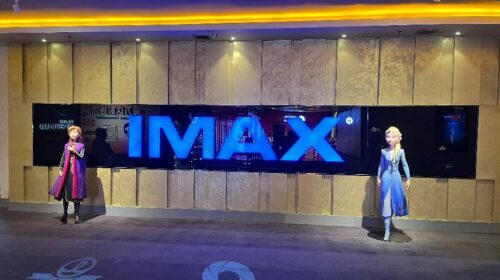Imax China bows from Hong Kong after failing to find an audience

The big screen theater technology company has offered to buy out its Hong Kong-listed China unit at a price well above recent trading levels, but just a third of its IPO price from 2015
Key Takeaways:
- Imax China is being privatized by its Canadian parent, ending an eight-year experiment with its separate listing on the Hong Kong Stock Exchange
- Imax China reported $73 million in revenue last year, or about a quarter of its parent’s $300 million, and was profitable, even as its parent recorded a loss for the year
By Edith Terry
If stock market comings-and-goings are all about timing, many may be scratching their heads at a privatization plan announced last week by Imax China Holding Inc. (1970.HK), the separately listed Chinese unit of big-screen theater giant Imax Corp. (IMAX.TO).
Under the privatization plan, the U.S.-listed Imax would buy all of Imax China’s Hong Kong-listed shares that it doesn’t already own for HK$10 apiece, representing a nearly 50% premium over the stock’s levels for the 30 trading days before the announcement. Imax China’s shares shot up 27% the day after the announcement, and have inched up since then to the HK$9.50 level.
But all of that said, the big question remains: Why now?
Granted, the pandemic years were rocky for all cinema operators in China, as theaters were often forced to shut for months at a time, and frequently had to limit their capacity even when open to minimize the risk of spreading the Covid-19 virus. But all that ended with China’s scrapping of most of its Covid restrictions at the end of last year, and pandemic-weary Chinese returned to movie theaters with a vengeance.
Imax China was a prime beneficiary of that trend with a record-breaking start to 2023. The company took in 231 million yuan ($32 million) in box office receipts during the Lunar New Year holiday period in late January and February, up 72% from the previous year, according to Imax China. The strong performance rested largely on the big success of an Imax version of “The Wandering Earth 2,” the sequel to the original film based on a popular Chinese sci-fi novel.
Imax China has gone to lengths to make itself a truly Chinese company, using its digital remastering technology not only to scale up domestic films like “Wandering Earth” and its sequel to the Imax format, but also working with local studios to produce original Chinese-language Imax films. Right after its Hong Kong IPO in October 2015, it also set up a fund to develop a Chinese-language film pipeline, even though the majority of Imax releases are imports.
Imax China also has a solid financial track record despite a three-year intermission during the pandemic. Last year the company earned a profit of $10.8 million on $73 million in revenue, lower than 2021 but well ahead of 2020 when most theaters were closed for the first half of the year at the start of the pandemic. By comparison, the company’s New York-listed parent reported a $22.8 million loss for the year on $300.8 million in revenues.
Imax had 794 Imax theaters in China at the end of 2022, with another 200 under negotiation. Most of its revenue comes from the sales and maintenance of its big-screen technology, which totaled $47.9 million in 2022 – or about two-thirds of its revenue for the year.
IMAX China’s latest market value is about HK$3.2 billion ($410 million), compared to $925 million for its parent on the New York Stock Exchange.
Undervalued
But despite boasting a market value that’s nearly half that of its parent’s, many may argue that Imax China is still highly undervalued. Even after the big jump following the announcement of the buyout offer, Imax China’s current market value is just a third of where it stood when it sold its IPO shares for HK$31 apiece in 2015. The IPO raised HK$1.9 billion for the 62 million shares Imax sold, representing 17.4% of Imax China’s total shares outstanding at the time.
Now, the parent is basically buying back those same IPO shares for just a third-of what it sold them for eight years ago. Shareholders of the parent Imax seemed to understand the big bargain presented by the buyout, bidding up that company’s New York-listed shares by 8.8% after the announcement.
Despite the big declines for its stock over the years, Imax China’s shares still trade at a relatively high price-to-earnings (P/E) ratio of 40, and a similarly high price-to-sales (P/S) ratio of 5.7. Still, a majority of analysts who follow the company aren’t too bullish on its prospects, with 12 of the 19 surveyed by Yahoo Finance rating its shares a “hold,” “underperform” or “sell.”
Imax China’s weak performance follows a broader pattern for non-Chinese brands that list in Hong Kong. Such stocks, including the likes of Prada (1913.HK) and Samsonite (1910.HK), attract relatively little interest from local investors, with the result that many have thin trading volume.
The privatization seems almost guaranteed to succeed, since the parent company owns 71% of Imax China’s shares. That delisting would save the parent about $2 million annually, which represents the current costs of maintaining the Hong Kong listing. The parent will also gain more flexibility in managing its China business.
Imax entered China with its first screens in 2011. But its overall market penetration has stayed the same since 2015, at about 1% of China’s 80,000-plus screens and 4% of its box office. Nothing about Imax China or its Canadian parent is very new anymore either. Its projectors and massive curved screens were invented by four high-school friends in Galt, Ontario in 1967, and first displayed at the Canada pavilion at the Japan World Expo in Osaka in 1970.
The company’s CEO Richard Gelfond has been around almost as long. He and a partner bought the company in a leveraged buyout in 1994, and developed the digital technology to take it from a novelty to a fully commercial product used on big screens around the world. Gelfond told Harvard Business Review in a 2013 interview that he never expected to stick around so long.
Perhaps he’s now thinking the same thing about Imax China, after his Chinese project failed to win an audience in the global investment community.
Have a great investment idea but don’t know how to spread the word? We can help! Contact us for more details.
To subscribe to Bamboo Works weekly free newsletter, click here






